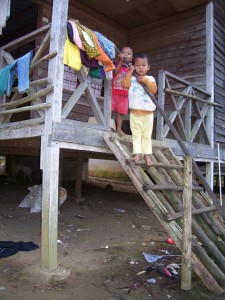The languages spoken by the Orang Asli of Malaysia preserve their wisdom, social concepts, environmental knowledge, and, for some, their beliefs about peacefulness. Preserving the languages and cultures of indigenous societies, such as that of the Semai, is a major issue for the people. It could be argued that preserving a healthy cultural diversity should also be important for larger nation states, such as Malaysia.

At times, Malaysia has appeared to be insensitive to the need to educate aboriginal children in their own ways as well as in the critical subjects of the modern world. Two news stories last year, one in July and the other in December, pointed out some of the difficulties that rural Semai communities sometimes have in just transporting their children to schools, much less the disappointments they face with teachers and schools that are repressive, culturally insensitive, and substandard.
Dr. Alias Abd Ghani, a lecturer from the Universiti Sains Malaysia, presented a much more positive impression of the improvements that Malaysia is making for the Semai children than those two news stories did in 2014. He gave a paper on revitalizing the Semai language at the 1st Asia-Pacific Conference on Advanced Research, held at the Education Development Centre, Adelaide, South Australia, July 23 – 24, 2015, which is freely available on the Internet.
Dr. Ghani focused on the efforts made by the Semai more than 15 years ago to promote the usage of their language by their young people—to keep it alive—and the responses by the government, starting in 1996, to address the issue. In addition to reviewing government literature and statistics, Ghani writes in his report that he interviewed Semai speakers, teachers in Semai schools, and government education officials. He also observed at a school in the town of Bidor, in Perak State.
He wrote that government officials and Semai representatives formed a committee in 1996 to address the concerns of the Semai people about the preservation of their culture through preserving their language. The committee was composed of people from the Curriculum Development Centre in the Ministry of Education, the government’s Department of Orang Asli Affairs, the Association of Orang Asli in Peninsular Malaysia, the Orang Asli Headmen, and some Semai teachers.
The group reached a consensus that Semai should be the first Orang Asli language to be included in the primary schools of Peninsular Malaysia. Semai would be taught by trained teachers and it would be included in the curriculum in addition to instruction in the two major languages of the country, English and Malay.
Two years later, the Semai Language Program was approved for the national curriculum. In 1998, six primary schools at Level I in Perak participated in a pilot program, and the following year six schools began teaching Semai at Level II. Semai language teaching was allotted 120 minutes per week of instruction time in the school programs.
Dr. Ghani indicated that the coordinating committee also began to prepare documentation of the Semai language. It developed a spelling system based on the Roman letters used for written Malay. He argued that the program of language revitalization in Perak has been well received by the Semai community and it appears to be quite successful. A few years later it was introduced into the schools in Pahang state. By 2001, the two states had 24 schools in which Semai was taught, including 41 trained teachers and 19 more resource teachers. By 2013-2014, the number of schools participating had grown to 28.
Ghani concluded that teaching Semai in the schools allows the Semai children to participate in an instruction program that focuses on their own cultural heritage. The program helps foster a positive self-identification among the Semai people, as it promotes preserving their language and valuing their cultural heritage. It could pave the way for revitalizing the other Orang Asli societies of Peninsular Malaysia.
Ghani, Alias Abd. 2015. “Revitalizing the Indigenous Semai Orang Asli Language in Malaysia.” Paper presented at the First Asia Pacific Conference on Advanced Research, Adelaide, South Australia